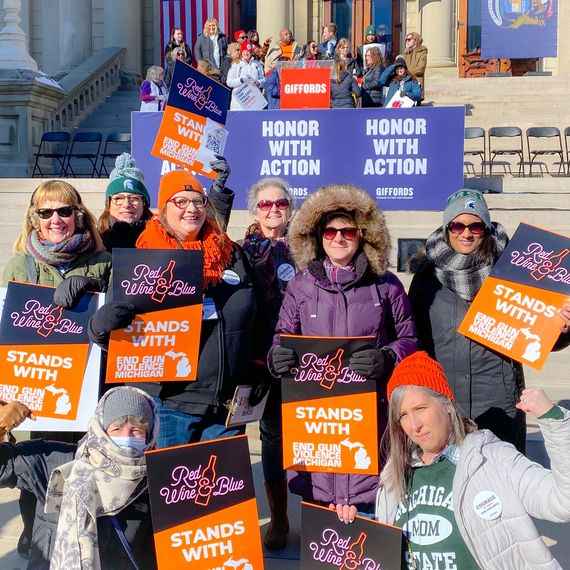
This article was featured in One Great Story, New York’s reading recommendation newsletter. Sign up here to get it nightly.
Christ is King,” announced signs in Dutchess County last spring. “Anthony Ciro DiLullo, WCSD Board. Vote May 17th.” He and a slate of far-right candidates running for school board were campaigning on “parents’ rights.” Some were endorsed by a local chapter of Moms for Liberty, a Florida-based group spearheading right-wing attacks on education nationwide through roughly 200 county chapters spread among nearly every state. Members are banning books, running for school board, and training others to do the same. Mother Jones anointed them “the Most Powerful Moms in America.” And they had descended on this politically purple swath of upstate New York.
The signs shocked Karen Svoboda of Fishkill, a mother of seven, including two who are gay, one who is bisexual, and another who is nonbinary. Then a friend introduced her to Laura Leigh Abby, a local mom who owns a fitness studio in Beacon with her wife. “She said, ‘These signs really, really upset me,’” Svoboda remembered. Abby had raised $500 to make alternative signs, and Svoboda, who has a background in nonprofit work, said, “We could get about 200 signs with that.” The women got to work and quickly settled on the phrase “Teachers shouldn’t be preachers” for their signs. Svoboda then felt they needed something else: an underlying message. She bought a URL from GoDaddy and Defense of Democracy was born.
“I knew who Moms for Liberty were because during the pandemic, I had watched the national news, and I could see the absolute shitshow that was school boards in Florida,” Svoboda said. After discovering social-media posts from Moms for Liberty claiming that same-sex marriages sexualized children, she recruited volunteers to run an awareness campaign. They used their new website to mobilize, put out their own street signs, and “had people looking for information about who Moms for Liberty were,” she said. “We posted everything that we found. I’ve never had content come to me so quickly — and so blatantly racist, homophobic, pro-religion in school.”
The far-right candidates all lost, but Svoboda said Moms for Liberty was vocal about the fact that it would try again. So she and Abby incorporated Defense of Democracy as a nonprofit in October, and now they say they have a chapter in every state. The group has a saying, Svoboda told me: “More good than bad.” Meaning there are more people on their side than there are on the other.
They nevertheless face a voracious enemy. Moms for Liberty is eager for power, and Republicans appear just as eager to claim the group. The party can sometimes struggle with women voters, and right-wing moms put a smiling face on its largely unpopular “parental rights” agenda. The strategy has had mixed results. Although candidates affiliated with Moms for Liberty have won some school-board races, they’ve lost plenty, too — and their efforts have provoked a quieter but no less significant backlash. Motherhood isn’t just for conservatives: Across the country, moms like Svoboda are fighting back against Moms for Liberty and the extremist movement it represents. Some are the parents of trans, nonbinary, and queer children; others simply oppose censorship. Many live in the suburbs. Others do not. What they share, though, is a commitment to families the far right deems illegitimate.
Today’s battles have old roots, said Dr. Adam Laats, a historian of education at Binghamton University and the author of Fundamentalist U: Keeping the Faith in American Higher Education. “Our current pattern of school culture-warring goes back about a hundred years,” Laats said, and women were often in the forefront. During World War I, new textbooks began to incorporate the ideas of progressive historians such as Charles A. Beard, who emphasized the role of socioeconomic conflict in American history. In the early 20th century, the Daughters of the American Revolution argued that “schools were intentionally sexualizing kids and teaching badly on purpose to make kids soft for a kind of socialist message,” he said. Further to the right, the women’s auxiliary of the Ku Klux Klan “was large and very much about moms and liberty and defending the traditional family and traditional schooling.”
Conservative figures understood motherhood to be a potent political force. Phyllis Schlafly, the anti-feminist founder of the Eagle Forum, suppressed the Equal Rights Amendment by claiming that it would harm housewives and homemakers. Singer and orange juice spokeswoman Anita Bryant said she knew, as a mother, that children needed to be protected from gay people as she attacked Miami’s LGBTQ+ community in the 1970s. Earlier, in the 1960s, Texas mother Norma Gabler discovered that the state was obliged to hear citizen objections to curricula, and she decided to participate. “She prepared reams and reams of really scathing criticisms of these textbooks,” Laats said, and over time, she helped convince Texas “to adapt to what one person … decided was proper Americanism.” In 1970, her efforts led Texas to require the publishers of science textbooks to include disclaimers that evolution was a theory, not a fact. Despite the sophistication of her strategy, and the fact that her organization employed eight people to review textbooks, she would tell the public she was “‘just a mom. I’m a homemaker,’” Laats said.
In 2016, another conservative mom decided to take a run at politics. Tina Descovich was elected to the Brevard County, Florida, school board and became chair two years later, when she also assumed the presidency of the right-leaning Florida Coalition of School Board Members. When she lost her seat in 2020, observers were shocked. The loss could have been the end of her political career, but she had sweeping ambitions. She co-founded Moms for Liberty in 2021, and since then, she has taken her agenda nationwide. At the group’s inception, members railed against COVID lockdowns and masking requirements in public schools. Now they’ve moved on to fighting sex and diversity education.
Moms for Liberty can “come off as wanting to be these parents who want more input in their child’s education,” said Jen Reinagel, an executive board member of the New York State Pride PTSA and the mother of a trans young adult. “But when you look at their actual agenda, you can realize that it really isn’t focused on the students as much as it is on their own personal and — a lot of the time — religious beliefs.”
The members Descovich calls “joyful warriors” aren’t subtle about their views, which tend to be vitriolically anti-LGBTQ+ with a fixation on transgender youth and adults. “Imagine believing your ‘modern ideas’ are so bold and virtuous that it’s only natural that they cancel the existence of women,” read one April post on the Facebook page for the Orange County, New York, chapter of Moms for Liberty. “The persistent erosion of Womanhood has permeated every crevice of society including, science, sports, workplaces, healthcare, classrooms, restrooms.” The post deadnamed college swimmer Lia Thomas, a trans woman who has become a right-wing obsession. “At what point do we put out the SOS for the feminists?” the chapter asked.
Although Descovich says that Moms for Liberty is politically diverse, she and co-founder Tiffany Justice have deep ties to the Florida GOP. “I have been trying for a dozen years to get 20- and 30-year-old females involved with the Republican Party, and it was a heavy lift to get that demographic,” Christian Ziegler, the vice-chairman of the state party, told the Washington Post. “But now Moms for Liberty has done it for me.” Ziegler’s wife, Bridget, was originally listed as a co-director of Moms for Liberty, which has also endorsed a number of conservative candidates in school-board and municipal elections across the country.
Power isn’t won entirely through the ballot box. Members of Moms for Liberty pursue it elsewhere, too, through censorship and harassment campaigns. In Florida, state officials are investigating public-school teacher Jenna Barbee after she decided to show Disney’s environmentally themed Strange World to her fifth-graders studying earth science. She had signed permission slips from each student’s parents to show PG-rated movies in class, but Strange World features a gay character, and one parent complained that Barbee had violated school policy by showing the film. The mom’s name is Shannon Rodriguez, Barbee alleges, and she sits on the local school board. Most tellingly, she was endorsed by Moms for Liberty.
Educators and activists who run afoul of Moms for Liberty say abuse is commonplace. After Stephanie Kline spoke at a recent press conference for a group fighting Moms for Liberty in Iredell County, North Carolina, she said the local Moms for Liberty chapter put photos of her son online. “They have this idea that we have this group that meets and we’re doing all these crazy things to them,” said Kline, who founded C.L.E.V.E.R., a support group for local LGBTQ+ youth. Others have followed Moms for Liberty’s lead. When the pastor of a local church took screenshots of Kline’s Facebook page and put them on Instagram, she said she received threats of harm. “My kid had to have a police officer follow him around at school, and it was literally just because the kids had a rally — because they walked down the street with Pride flags,” she said.
In Orange County, members harassed the school superintendent, Larry Leaven, who is gay. “The group, because they have some type of mental illness, they felt I had an agenda,” he told Vice News, which reported that they berated him in person at school-board meetings and called for his resignation. Members of a Moms for Liberty Facebook group donated to three school-board candidates who ran coordinated campaigns “obviously directed at Leaven,” the Albany Times Union reported. Not long after the candidates won, Leaven resigned and Moms for Liberty celebrated. “Take your pornographic indoctrination back where you came from,” read a post on the Orange County chapter’s Facebook page. “This is what happens when you mess with our children in OCNY.”
If conservative extremists can make motherhood a tool, so too can their opponents. At the same time Schlafly was rallying white conservative women around the notion of full-time motherhood in the 1970s, liberals and feminists responded by deploying their own versions of parental language. “Women, especially in the Equal Rights Amendment fight, were really sensitive to this false attack that they were against homemakers or motherhood or family,” said Dr. Stacie Taranto, a professor of history at the Ramapo College of New Jersey and the author of Kitchen Table Politics: Conservative Women and Family Values in New York. When Eleanor Smeal was elected president of the National Organization for Women in 1977, she identified as a homemaker, and that was part of her appeal. Feminists “tie some of that into the push at the state level for no-fault divorce in different states because they say that a lot of full-time homemakers get screwed over because they can’t initiate divorce on their own terms,” Taranto added. “They’re really clear that they’re not against motherhood. They’re not even against full-time motherhood and homemaking; they just want it to be a choice.”
Feminist notions of freedom cut directly against conservative visions of womanhood and motherhood, which imagine both to be compulsory roles. The rise of Moms for Liberty coincides with the right-wing campaign that ended Roe v. Wade. Criticisms of no-fault divorce are becoming more frequent. The movement’s attacks on LGBTQ+ people, and on trans people in particular, insist on gender as an immutable reality. Conservative women aren’t building a refuge for themselves — they’re building a cage, and that repels many other women.
In 2019, two years before Descovich founded Moms for Liberty, Katie Paris created her own nonprofit group, Red Wine and Blue, to get suburban women engaged in politics. “It was really two things happening at once,” Paris told me: Democrats had overperformed in the midterms thanks in part to suburban women, who had become more politically engaged after the election of Donald Trump, an unrepentant misogynist. Paris, a former executive of the liberal group Media Matters for America, was working as CEO of another progressive outlet when she decided to quit telecommuting to Washington, D.C., from Ohio, where she had moved with her family. “I think my highest, best use is here now,” she told herself. After the 2020 election, Paris said members of her group started noticing right-wing attacks on education “before anyone was talking about it inside the Beltway.” She added, “It really started to overtake so many of our communities because we know it’s these rapidly diversifying, majority-white suburbs where conservatives seem to be hell-bent on trying to scare people into supporting them.” The group now has suburban moms organizing in Ohio, Michigan, Pennsylvania, North Carolina, and Virginia.
In May, Red Wine and Blue announced a new campaign called “Freedom to Parent.” They’re adopting an approach that Paris calls “relational organizing” to activate moms and dads. Parents could attend a recent virtual event hosted by moms of trans and nonbinary children, and a detailed section on the group’s website picks apart phrases common to Moms for Liberty. “If you hear the term ‘CRT,’ or Critical Race Theory, anywhere near anything about K-12, you can guarantee that you’ve been targeted by a disinformation campaign,” the website explains.
Moms for Liberty did not invent the right wing’s attacks on education but rather followed the prevailing winds. Efforts to force LGBTQ+ people back into the closet don’t always have Moms for Liberty in the lead, either. The group makes the most sense as a front for the Republican Party and the broader conservative movement. Republican lawmakers are eager to take up the cause with or without the group’s help. That, too, can force moms into forms of public opposition.
Montana once looked like a haven to Darcy Saffer, who moved there with her family two decades ago and left behind fundamentalist Christianity to raise her four children outside its strictures. When her eldest child was in eighth grade, they came out as nonbinary and now identifies as trans nonbinary. “That was a whole journey,” Saffer said, adding that she knew few people in the LGBTQ+ community at the time and was on her own path to discovering that she was queer. Years later, in 2021, another of her children came out as gender nonconforming and trans. “Right about the time that they’re growing up and figuring out who they are, the politics in this state took a sharp downward spiral toward fascism,” she told me, referring to the election of the far-right governor Greg Gianforte.
When her second child entered freshman year during the pandemic and logged on for class, “someone had changed the background of their Google Classroom to a large photo of a torn-up Pride flag that had a big red X through it,” she said. Both children have been called slurs in school, she added, and have had food thrown at them because they sit at “the gay table” in the cafeteria. Saffer testified virtually against two anti-trans bills during a previous legislative session and this year lost a day’s pay to drive to Helena to testify in person with a friend. “We went up there with a bunch of other people, and we stayed the whole time and we testified and it was exhausting,” she said. “It was exhausting to sit there and listen to so many people just tell lies and say really hateful things about kids and about parents just like us. It was rough.” After State Representative Zooey Zephyr, a transgender Democratic lawmaker, said her colleagues would have blood on their hands for outlawing transgender care for minors, Republicans blocked her from speaking and then banned her from the House floor altogether. They passed the ban anyway.
In Williamson County, Tennessee, Revida Rahman first began organizing in 2018 against an elementary school’s field trips to local plantations, which, she said, “seemed to gloss over the truth.” Five Black families reached out to the principal to express their concern and to discuss teacher diversity and the disproportionate rates of discipline faced by students of color. That work contributed to the formation of One Willco, a group Rahman co-founded with another local mom, Jennifer Cortez. “We show up consistently for school-board meetings to make sure that our face is known,” added Rahman, who also spoke at the launch of Red Wine and Blue’s “Freedom to Parent” campaign in May. The county has an active Moms for Liberty chapter, which last year called for the removal of 31 books from the K–5 curriculum. That didn’t quite work out the way Moms for Liberty had hoped: A committee of parents, educators, and community members formed in response had recommended the removal of only one book. One Willco is now focused on empowering students, Rahman said. “Why are we not asking the teachers about their feedback?” she asked. “It’s like we have all these outsiders making decisions for us, and what’s troubling is that most of the books that they get their marching orders to complain about, they haven’t even read it.”
After a police officer body-slammed a student in a school near Austin, Texas, in 2015, Black families there founded the Round Rock Black Parents Association. Today, the group frequently deals with Moms for Liberty and its book bans. After bringing together a coalition of local groups, Round Rock was able to stop the bans. “But now we are seeing in the state legislature that they’re trying to make things even worse,” said Ashley Walker, the group’s co-director of communications. Amber Watts of the Austin Justice Coalition has also noticed that parents who try to ban books often seem unfamiliar with their contents. “They were trying to ban Stamped From the Beginning, the book that was written for middle-school and elementary-age students, by Jason Reynolds and Ibram X. Kendi,” Watts said. “But it came from a parent who literally read one line in the book, and he didn’t like it and said that it made his child uncomfortable.” Their shared hope is to create an environment in which Black families can thrive without, Walker said, “having limitations on what we can learn, what we can read, how we present in life.”
There are significant challenges ahead for all of these mothers. In Florida, where Moms for Liberty began, the fight can look especially dire. Betsy Braden’s daughter attends the New College of Florida, which was recently taken over by far-right allies of Governor Ron DeSantis. She and a group of parents, students, and alumni are organizing to counter the takeover, and she recently attended a conservative Leadership Institute summit to learn more about the other side, including Moms for Liberty. “I mean, we have fascism here. I hate to say it,” Braden said. “My husband’s like, ‘Don’t say that — it turns off Middle America.’ I’m like, ‘Well, that’s what it is.’” That’s why she likes her group of parent advocates at New College. “We know what’s going on. We know what they’re doing,” she said. She hopes to attend the next school-board meeting in Barbee’s district. Defense of Democracy is mobilizing people to go, she told me.
If moms like her are going to win their fights, they need support. Braden, for instance, wishes the national Democratic Party would invest more in Florida. In Montana, Saffer believes Republicans there have a supermajority partly because Democrats aren’t running for rural seats. “Those of us who have been activists, or just parents trying to get more funding for schools or for SNAP benefits or for whatever it is, trying to get people to pay attention to what’s happening in Montana is impossible,” she said. “People haven’t cared, unless you live here.” Paris of Red Wine and Blue said that her group is trying to fill a gap by “actually supporting women organizing in suburban communities. So, rather than talking at them, listening to them.” Her members are furious about “visceral” recent attacks on reproductive rights and on public education. “It sometimes just gets missed by the Establishment how personal and significant these issues are,” she added.
Moms for Liberty may fade, as so many groups like it have, but its impact could be lasting. Conservative women are good at rallying the Republican Party around themselves in the name of traditional family values. The party belongs to them now, though this has not always been good for the party’s electoral chances. Culture-war messages aren’t reliably winning school-board races, and in May, Daniel Davis lost his race to become the next Republican mayor of Jacksonville, Florida, after he embraced Moms for Liberty. The fight is hard, but for the moms who strike back, there’s hope. Svoboda’s saying endures: More good than bad.

































